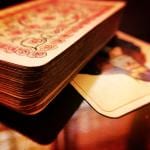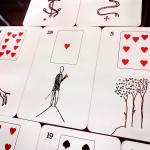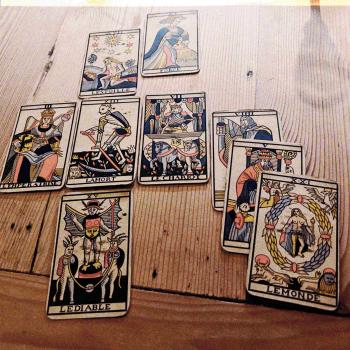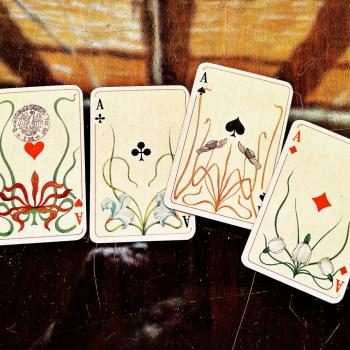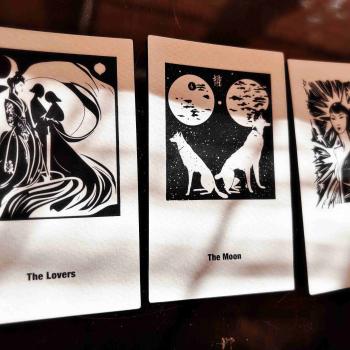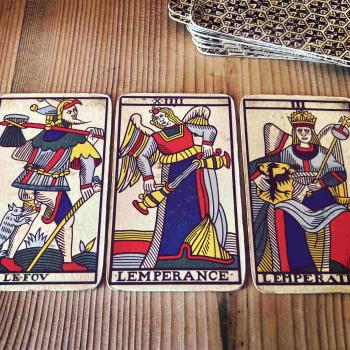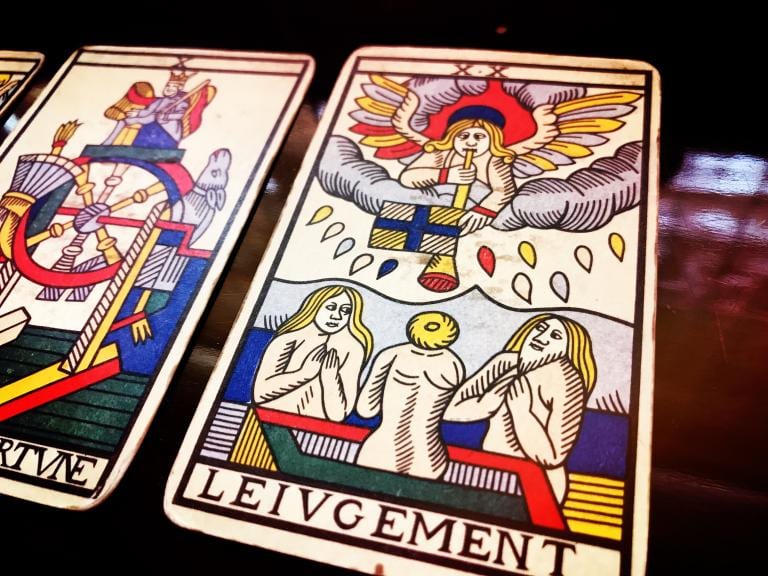
Some think that the popularity of the Tarot is almost entirely due to the genius of Pamela Colman Smith having designed the Waite-Smith Tarot for the publisher Rider in 1909. The images hit a nerve, but they only did so because there was a template for targeting the self in relation to the desire for a specific identity. Just think of the 10-card spread, the Celtic Cross, with the cards arranged in positions that give you the key to transformation. The premise for it is that it takes the temperature of a basic question towards transformation: how is your self doing? In order to answer this question, the Celtic Cross poses other related questions as well: how are the others you work or live with doing? How are your hopes and fears doing? How is the obstacle that crosses you doing? Is it big or is it small? How is your past doing? Have you managed to integrate it into your future? Here comes some shadow work for you that will help you with the question of how your present is doing. Are your earning enough? Are you loved, and are you happy?
The cards answer all these questions. You look at them, and if you don’t like what you see, you change it. This is transformation for all it’s worth, or at least the cost of what you have to put down for your pack of cards and some instruction on how to use them.
All fine. But when it comes to posing true questions, I’ve found that following self-help templates is not so helpful. Why? For the simple reason that such templates lack distinction, as they lead us to a place of promise sans delivery. My favorite example is the analogy line that creates a false correlation: ‘you too can be like the Queen of Spades. Say no to pleasing people, and just be yourself. You’re perfect.’
The idea that humans are perfect is correct, but only insofar as this perfection is not already irredeemably buried under layers and layers of ignorance. This ignorance manifests itself as a paradox: the desire to both belong to a group of people that sees you and understands you, ‘just as you are,’ yet against the claim that obviously the Queen of Swords needs no others to validate her. Ha. Isn’t this a beaut? The entry ticket to the validation cult is this: the Queen of Swords gives no fucks, and therefore she totally needs others who are like her to tell her how great she is. Talk about the logic of this…
Now, as I’ve already written a lot about this conundrum in What is Not: Marseille Tarot à la Carte, and more recently in Read Like the Devil: The Essential Course in Reading the Marseille Tarot, I won’t repeat what I said there, but the gist of it is that we can do more with the cards that merely use them as a platform for self-validation or as a platform to validate the others we read for. As far as my practice is concerned, I never read the cards for validation. I read them for clarity. Validation and clarity are not the same.
Here’s what I suggest: you can ask the cards questions that are simply true, that is to say, questions that spring out of the motivation to learn distinction. If you ask the question about what motivates you, what expectation do you have in mind? If it’s about the desire to be validated, then you can take that as a cue that you’re already following a cult. If you follow a cult, you don’t need to use the cards for anything, as the cult is very good at telling you already what you are, how you’re doing, and what you should be feeling instead. The validation cult speaks the language of certitude: you’re like this, you’re like that, you feel like this, or like that, with the line of certitudes abounding in the department of the miserable. Therefore, out with the old, little you, in with the new, big and magical you, by the powers of some 12-step program.
If you fall for this, ask the cards about your addictive personality, and then ask the cards to validate to what extent what you’re addicted to – the idea of transformation being one of them – springs out of a true question; chances are that it doesn’t. Look at the picture you get for it. Ask the cards to tell you something about the red pills you swallow, about your need to say to a group of peers: ‘thank you for seeing me, thank you for not judging me, thank you for accepting me as I am, thank you for accepting my inner demons too, and so on…’
Then ask the cards about these others. How much investing do they do in you, you think, especially when they’re there for your validation as well? Conversely, ask the cards about why you’re provoked by the idea of being judged, critiqued, trashed downright, and shunned. If and when this happens and you want to run away from the rejection, how do you judge yourself this act of running away? Personally, I’m all for judging, for critique, for how else do we learn? That’s why I made a career in teaching, in correcting the kind of learning that doesn’t work.
Finally ask the cards about self-reflection, not self-improvement or the acceptance of others. True questions arise from self-reflection, from sitting quietly with the question of being motivated towards transformation, so that you get to what you need to do all by yourself, not because there’s a community that supports you in your quest. A client recently asked in disbelief: ‘you, mean, I just have to sit with it? How will I know that what I come up with will not be the same as what I get from all the promises for the benefit of group work?’
I share her cards here: The World, the Wheel of Fortune, and Judgment. We laughed a bit at the order of the cards, what with the card of public heralding and groups being in the last position, so you’d think that what it takes towards developing the art of distinction is actually a community. Yes and no.
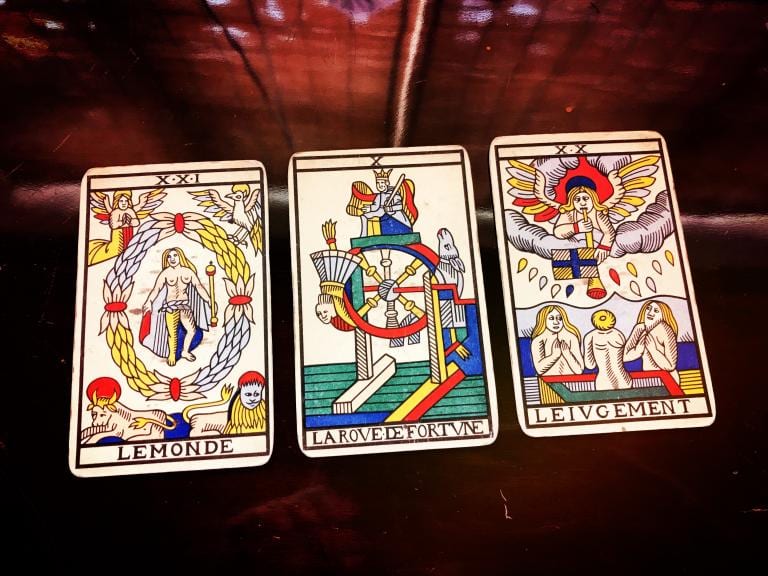
Let’s look at the no first. The whole purpose with sitting quietly with a true question is that it gives you access to how you can contain your energy, to how you can mind your own business. That’s what the World card is here for, to show you the purpose of self-reliance. Others may be in attendance to your needs, but these others remain external to your inner, private circle. Once the premise for minding your business is consolidated, then whatever change comes, including getting embroiled in other people’s needs, or watching them repeat the same cycles over and over again without the possibility to exercise personal agency, will have the effect of knowing your place in relation to others. You’ll know what the good news is, not because others will beg you to listen, but because you already have the clarity it takes to know and distinguish between the various broadcasting channels, some more fake than others, some enlightening and inspiring.
And yes, indeed, for the yes, it does take a community to learn the art of distinction. Without reflecting on what drives people and how that manifests, how are you going to learn something about your own positioning? If they all flock to the next idea in vogue, will you join them just like that, on opinion, or will you use your own judgment to discern to what extent the new idea in vogue is worth its salt?
About asking true questions, I’m conducting a seminar this Sunday for the Incite Seminars group that focusses on rigorous thinking, related to the publication of my book, The Childless Witch. I wrote this book primarily to address how we can think outside of the false consciousness that circumscribes the self as a needy self, craving constant validation for the manifestation of a persona that’s far removed from the actual realization of truth, of the now, the now being the only position that can give us access to self-reflection. My examples come from the performing arts and personal stories that surprise and astonish. You’re welcome.
♠
For more such practice with the cards, join the Read like the Devil Club. Visit also Aradia Academy and sign up for the newsletter that will keep you informed on upcoming courses and cartomantic activities. Note the Off the Shelf offering that also includes free resources. Or, check out my books on the philosophy and practice of divination at EyeCorner Press.

